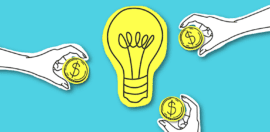How a microfinance group could be the key to helping Australia build back better

29 July 2020 at 6:26 pm
Global microfinance group Grameen has set up shop in Australia at a time when vulnerable people are facing more uncertainty than ever before. Pro Bono News sat down with the organisation’s new CEO to find out what the future holds.
Adam Mooney first came across the Grameen model in 2003, while working as a finance advisor for a development organisation in Cambodia.
It was something, he tells Pro Bono News, that shifted his perspective on impact work forever.
“I was sitting with a group of about 30 women in a remote village in Cambodia and seeing this very skilled facilitator ask the women to describe their environment, and to describe their aspirations, dreams and hopes for the future,” Mooney said.
Very quickly, the women separated themselves into industry groups – weaving, market gardening, a fishing co-operative, and an artwork collective – discussing the skills they had between them, and the resources they required, such as bicycles for transportation, to get their ideas off the ground.
“[I was] watching this happen in a single afternoon, and seeing the change from what was previously a community that really didn’t have much hope, [to] by the end of the day, [one where] there were action plans, and loans were disbursed,” Mooney said.
Now Mooney is taking on the task of bringing the Grameen model to Australia. Developed by Nobel Laureate Professor Muhammad Yunus, the model has operated in developing countries throughout Asia, Africa and South America since the late 1970’s. Around 10 years ago it made the move into the United States.
It works by lending small amounts of working capital – called microfinance – to a group of borrowers who are collectively responsible for each repaying their loans.
While Mooney has spent a number of years working in the microfinance space (he was the inaugural CEO of Good Shepherd Microfinance for seven years), the unique aspect of bringing together people to work on a single idea is what drew him to the model in the first place.
“It’s about income generation, but doing it in a way where there is a peer support network that’s with you every step of the way,” he said.
“It goes way beyond the businesses that have been created. It allows people to come together and share hope, to break down barriers, feel connected, learn, and to bust myths about different cultures and different people.”
The organisation also offers support, mentoring, training and business education to the groups of people they lend money to. Unlike transactional banking, the model has a built-in savings component which requires clients to save and promotes asset building.
How the model will fit in an Australian context is still being figured out, but Mooney said the organisation was committed to boosting employment through supporting people on low incomes to set up their own small businesses in Australia’s post-COVID future.
He said the model lent itself very well to work within Aboriginal and Torres Strait Islander and migrant communities in particular.
“In Indigenous communities there’s already a cultural familiarity with working as a collective, where the identity of people is very much attached to a clan group within a community,” he said.
“I’m on the board of an organisation in East Arnhem Land and I’ve seen Aboriginal women in particular, who are right at the centre of community, running weaving cooperatives, cultural tourism and other really important and valuable enterprises.”
He noted that the model was about working within cultures, rather than trying to change them.
“The whole process of formation is about one or two people inviting others to join that cooperative, and we are just there to provide the place – whether that be physical or virtual – for the conversation to happen,” he said.
A different model for a different world
The back-to-back summer bushfire and coronavirus disasters has left Australia facing economic uncertainty like never before.
Over 800,000 jobs have been lost nationwide since March, and reports show that women have been harder hit in these crises than men.
Grameen Australia’s chair, Ian Neil SC, said the organisation’s approach to developing social businesses with local group support and appropriate lending and savings provided a sustainable solution to the issue at hand.
“Our country is facing the highest unemployment rates in decades with hundreds of thousands financially excluded,” Neil said.
“This not only creates a reliance on charity and welfare but often pushes people to seek out loans through fringe lenders at exorbitant rates, resulting in an unending debt cycle.”
Mooney said there were currently millions of entrepreneurs not fully served by mainstream financial institutions – many of them women on low incomes, including from Aboriginal and migrant communities – who were keen to start or grow a business.
He said providing vulnerable people with an opportunity to take control of their economic futures was critical as Australia and the rest of the world navigated through a post-COVID world.
“Our founder, Professor Muhammad Yunus, has been saying over the past couple of weeks that the current model of the economic machine through the coronavirus has gone to sleep,” he said.
“And the question has to be asked if we really want to go back to that, because we were seeing record levels of wealth inequality throughout the world, terrible outcomes with environmental degradation, and people losing work due to technology and artificial intelligence.
“This is all about building a much better way of working, redesigning, if you like, the whole economic system where people are in control.”
Find out more about Grameen Australia and its upcoming launch here.







